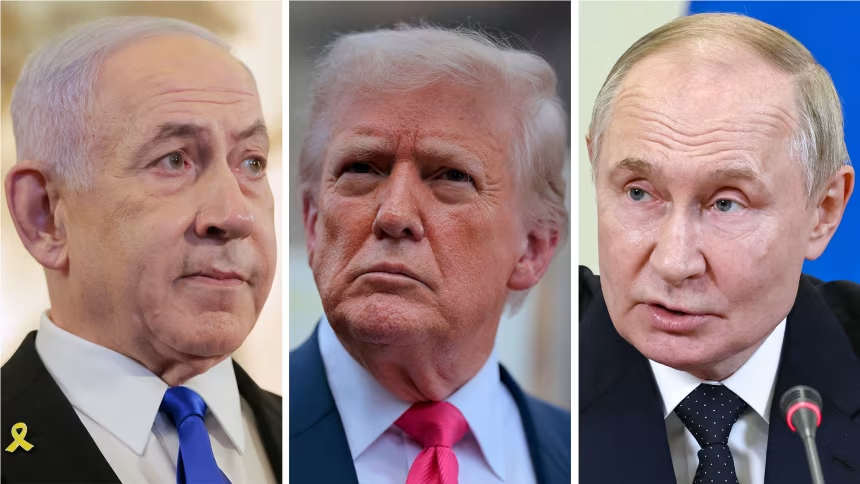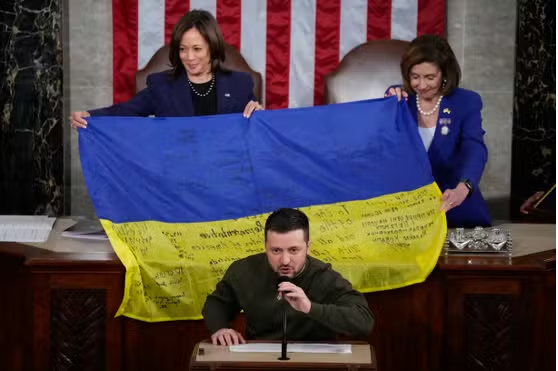
As ex-U.S. President Donald Trump prepares for a political return, his previously tactical connections with two of the globe’s most divisive leaders — Russia’s Vladimir Putin and Israel’s Benjamin Netanyahu — are exhibiting signs of weakening. These strained relationships now present major obstacles to Trump’s goal of regaining authority over U.S. foreign policy, especially in a more unstable global environment influenced by the conflicts in Ukraine and Gaza.
Previously Close, Now Challenging
In his first term, Trump became well-known for his unconventional affinity for strongmen, proudly cultivating warm, and frequently contentious, personal connections with both Putin and Netanyahu. His relationship with Putin was perceived as remarkably friendly for a U.S. president, frequently overlooking intelligence alerts and steering clear of condemning the Kremlin’s international actions. Meanwhile, Trump commended Netanyahu as a partner in changing the Middle East, endorsing the Abraham Accords and moving the U.S. embassy.

Embassy to Jerusalem.
However, looking ahead to 2025, the situation has shifted.
Netanyahu, even as prime minister, has separated himself from explicit alignment with Trump. In the wake of January 6 and Trump’s tumultuous exit from office, Israeli leaders have discreetly adjusted their dependence on any individual American figure. Reports indicate that Netanyahu was extremely irritated by Trump’s erratic behavior, particularly during the Iran nuclear situation and the following regional tensions. While Trump seeks loyalty, Netanyahu is concentrating on preserving bipartisan backing in Washington, especially as Israel encounters global criticism regarding its actions in Gaza.
Putin no longer sees Trump as the key to undermining NATO or disrupting Western unity.Trump’s tenuous relationships with Putin and Netanyahu weaken his strategies in foreign policy.
. While Trump often condemns the extent of U.S. backing for Kyiv and hints at isolationist ideas, Putin has deepened his alliances with China, Iran, and North Korea. His tactical assessments no longer depend on Trump’s comeback, and Moscow seems doubtful that a second Trump term would yield significant geopolitical benefits.
An International Agenda Lacking Partners
Trump’s goals to redefine America’s position globally — via transactional diplomacy, assertive tariffs, and prioritizing American military caution — depend on essential international partnerships. Nonetheless, the deterioration of relations with two of his key international contacts complicates that approach.
Absent Netanyahu’s wholehearted support, Trump encounters resistance from conventional pro-Israel Republicans who are now doubtful of his inconsistent stance on Middle East policy. His latest remarks suggesting that Israel should “act smarter” in Gaza have sparked anger among hardline backers, yet have not garnered support from moderate perspectives who view the comments as self-serving.
In Eastern Europe, Trump’s connection with Putin — previously a point of discussion among his supporters — has turned into a disadvantage. The continuing conflict in Ukraine has strengthened public opinion in support of Ukraine, including among numerous Republican voters. Trump’s unclear position, which includes claims he might “resolve the conflict in 24 hours,” has faced extensive criticism for being unrealistic or undermining Ukraine’s sovereignty.

Seclusion Over Impact
What used to provide Trump an advantage — connections with contentious leaders — is now a burden harming his credibility. Putin and Netanyahu seem to be engaged in long-term geopolitical strategies, whereas Trump is focused on domestic issues, campaign slogans, and complaints about the 2020 election.
His inability to adjust to these new circumstances indicates a more profound problem: Trump’s foreign policy might not align with the current global reality. He no longer holds the same diplomatic influence internationally, and the leaders who previously accepted his unconventional approaches now seem to be diversifying their interests elsewhere.
Furthermore, emerging U.S. competitors such as China’s Xi Jinping and new regional actors in the Gulf and Global South appear uninterested in garnering favor with a Trump-led America. The MAGA brand might still connect domestically, but globally, it is increasingly perceived as inconsistent, untrustworthy, and self-interested.
Conclusion: A Leader Lacking Influence
For Trump to regain his influence in global matters, he needs to restore trust — both with international leaders and with the American voters, who continue to doubt the benefits of forming close ties with autocrats. As worldwide crises escalate, from Kyiv to Gaza, the lack of robust and reliable alliances could position Trump on the fringes of the very world he once aimed to dominate.
His international agenda, formerly strengthened by confidence and personal diplomacy, now faces the threat of being overshadowed by fractured alliances and lost chances.


